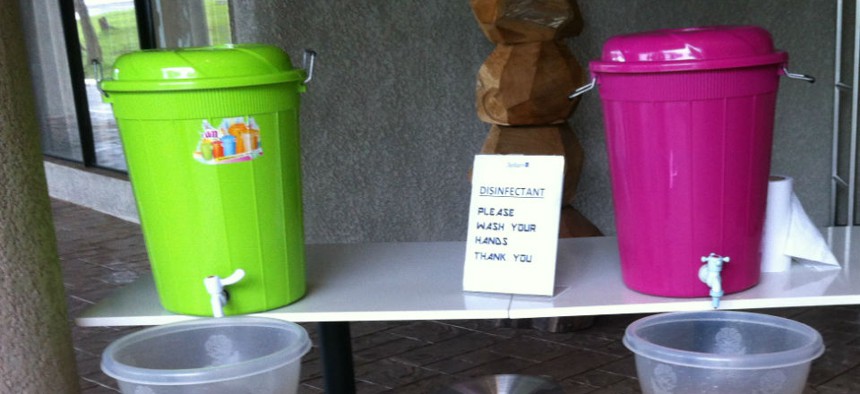
A hand-washing station at the airport in Sierra Leone. CDC
White House to America: Calm Down About a Domestic Ebola Outbreak
Officials say that unlike the affected West African nations, the U.S. is equipped to handle a potential epidemic.
The Obama administration has a message to Americans freaking out about Ebola: Stop.
A confirmed case of the disease in Dallas, as well as the hospitalization of two patients for Ebola-like symptoms in the Washington area, has set the public on edge and sparked fears of an outbreak on U.S. soil. And administration officials want to make perfectly clear that the circumstances in the affected countries of Liberia, Sierra Leone, and Guinea are worlds apart from the U.S.
"We respect your concern. We understand your concern. But the evidence tells us that that is not going to happen," said Dr. Anthony Fauci, director of the National Institute of Allergy and Infectious Diseases at the National Institutes of Health, during a press conference Friday. "And we have to say that a lot."
Unlike the affected West African countries, the U.S. is well equipped to stop a potential outbreak early. "The reason there is an outbreak [in West Africa] now is because the health care infrastructure in those countries is inadequate and incapable of handling the identification, isolation, rapid treatment, and contact tracing—something we have [in the U.S.]," Fauci said. "It's entirely conceivable there may be another case [here]. But the reason we feel confident is our structure would preclude an outbreak."
Liberia, Sierra Leone, and Guinea had not seen a case of Ebola until this year. Many people there don't understand how the virus spreads. Some have retaliated against physicians and health workers, fearing that they have made the outbreak worse. Local hospitals and health centers, already without medical supplies and resources considered standard in the U.S., are running out of beds for the sick.
A main priority, administration officials said Friday, is to get the epidemic in West Africa under control, eliminating the possibility of it spreading overseas.
President Obama announced last month the deployment of 3,000 U.S. military personnel to affected regions, as part of a six-month, approximately $750 million strategy to fight the outbreak. An additional 200 soldiers will now be sent, the Pentagon said Friday.
The troops will help to build treatment centers and offer logistical support. There are currently a couple hundred stationed in the region, mostly in Liberia. More will be deployed in mid- to late October, according to an Army statement.
As of Sept. 28, there have been 7,178 reported cases of Ebola, with 3,338 deaths, in West Africa, according to the latest estimates from the World Health Organization. The number of cases has more than quadrupled in the last two months, as the speed of infection continues to far exceed the rate of response. These tragic numbers should be enough to put Americans' fears about a few isolated cases at home—some not yet confirmed—into perspective.






